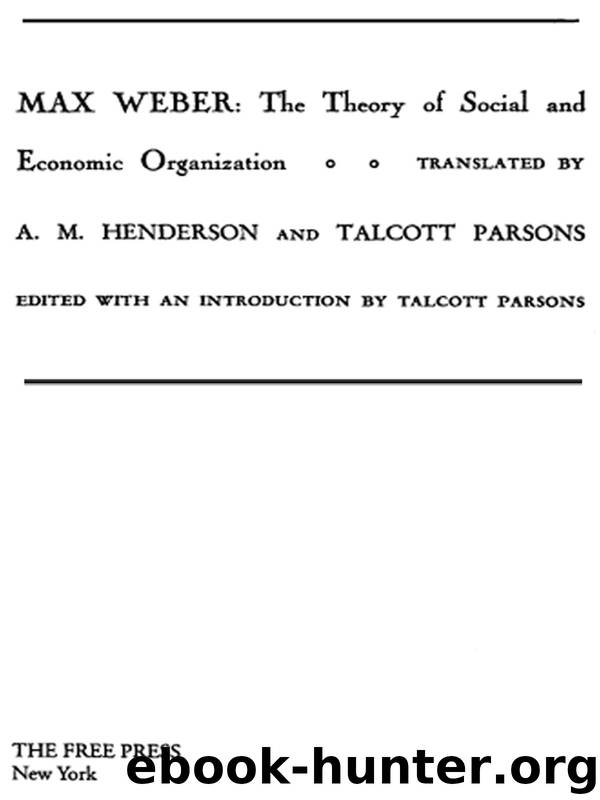The Theory Of Social And Economic Organization by Max Weber

Author:Max Weber [Weber, Max]
Language: eng
Format: azw3
Publisher: Free Press
Published: 2009-11-24T05:00:00+00:00
SOCIAL ASPECTS OF THE DIVISION OF LABOUR—(Continued)
The Appropriation of the Non-Human Means of Production
The non-human means of production may be appropriated by workers as individuals or as corporate groups, by owners, or by regulating groups consisting of third parties.
When appropriated by workers, it may be by the individual worker who then becomes the ‘owner’ of the non-human means of production; or the appropriation may be carried out by a more or less completely closed group of workers so that, though the individual worker is not the owner, the corporate group is. Such a corporate group may carry out its functions as a unitary economy as on a ‘communistic’ basis, or with appropriation of shares.70 In all these cases, appropriation may be used for the purposes of budgetary administration or for profit making.71
Appropriation by individual workers may exist in a system of completely free market relations, as between small peasants, artisans, boatmen, or taxi-drivers, each owning his own means of production. Where it is not the individual but a corporate group which is the agent of appropriation, there is a wide variety of possibilities, varying particularly with the extent to which the system is of a budgetary or a profit-making character. The household economy, which is in principle neither necessarily primitive nor in fact communistic, may be oriented wholly to provision for its own needs. Or it may, perhaps only occasionally, dispose of surpluses of certain types of raw material accumulated by virtue of a favourable location, or of products derived from some particular technical skill, as a means to better provision. This occasional sale may then develop into a regular system of profit-making exchange. In such cases it is common for ‘tribal’ crafts to develop with an interethnic specialization of function and exchange. Generally speaking, marketability depends on maintaining a monopoly, which in turn is usually secured by inherited secrets. These may develop into wandering craft groups or possibly pariah72 crafts. It is also possible, as in India, where these groups are united in a political structure and where there are ritual barriers between the ethnic elements, for them to develop into castes.
The case where members of the group possess appropriated shares is that of ‘producers’ co-operation.’73 Household economies may, with the development of money accounting, approach this type. Otherwise, it is only occasionally found, as an organization of workmen. There is, however, one important case closely approaching this type—the mining industry of the early Middle Ages.
Since appropriation by organized groups of workers has already been discussed, appropriation by ‘owners’ or organized groups of them can mean only the expropriation of the workers from the means of production, not merely as individuals, but as a whole. An owner may in this connexion appropriate one or more of the following items: land, including water; subterranean wealth; sources of power; work premises; labour equipment, such as tools, apparatus and machinery; and raw materials. In any given case all these may be concentrated in a single ownership or they may be appropriated by different owners.
Download
This site does not store any files on its server. We only index and link to content provided by other sites. Please contact the content providers to delete copyright contents if any and email us, we'll remove relevant links or contents immediately.
| Anthropology | Archaeology |
| Philosophy | Politics & Government |
| Social Sciences | Sociology |
| Women's Studies |
Nudge - Improving Decisions about Health, Wealth, and Happiness by Thaler Sunstein(7678)
The Fire Next Time by James Baldwin(5409)
iGen by Jean M. Twenge(5398)
Adulting by Kelly Williams Brown(4552)
The Sports Rules Book by Human Kinetics(4367)
The Hacking of the American Mind by Robert H. Lustig(4355)
The Ethical Slut by Janet W. Hardy(4232)
Captivate by Vanessa Van Edwards(3826)
Mummy Knew by Lisa James(3670)
In a Sunburned Country by Bill Bryson(3521)
The Worm at the Core by Sheldon Solomon(3467)
Ants Among Elephants by Sujatha Gidla(3449)
The 48 laws of power by Robert Greene & Joost Elffers(3201)
Suicide: A Study in Sociology by Emile Durkheim(3002)
The Slow Fix: Solve Problems, Work Smarter, and Live Better In a World Addicted to Speed by Carl Honore(2990)
The Tipping Point by Malcolm Gladwell(2896)
Humans of New York by Brandon Stanton(2859)
Handbook of Forensic Sociology and Psychology by Stephen J. Morewitz & Mark L. Goldstein(2687)
The Happy Hooker by Xaviera Hollander(2678)
